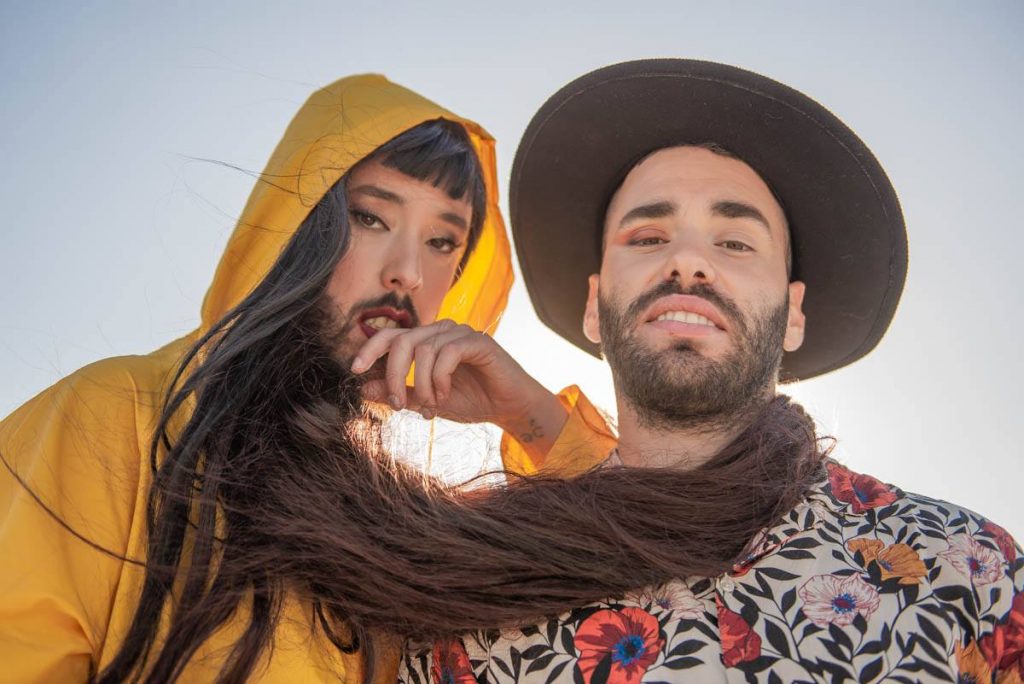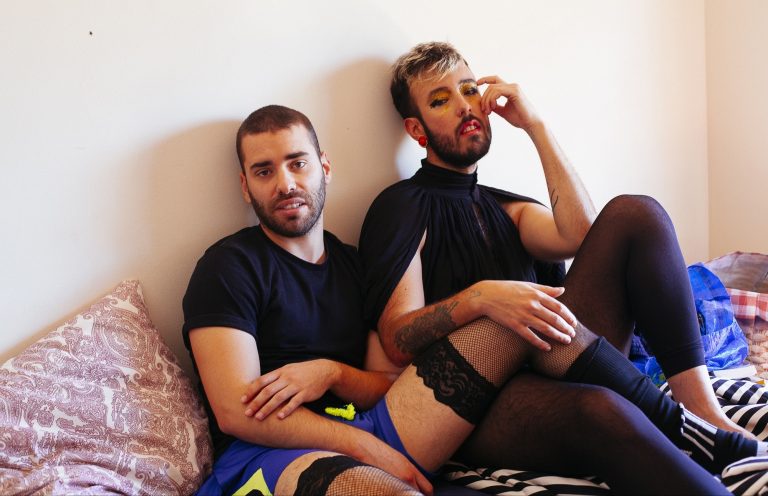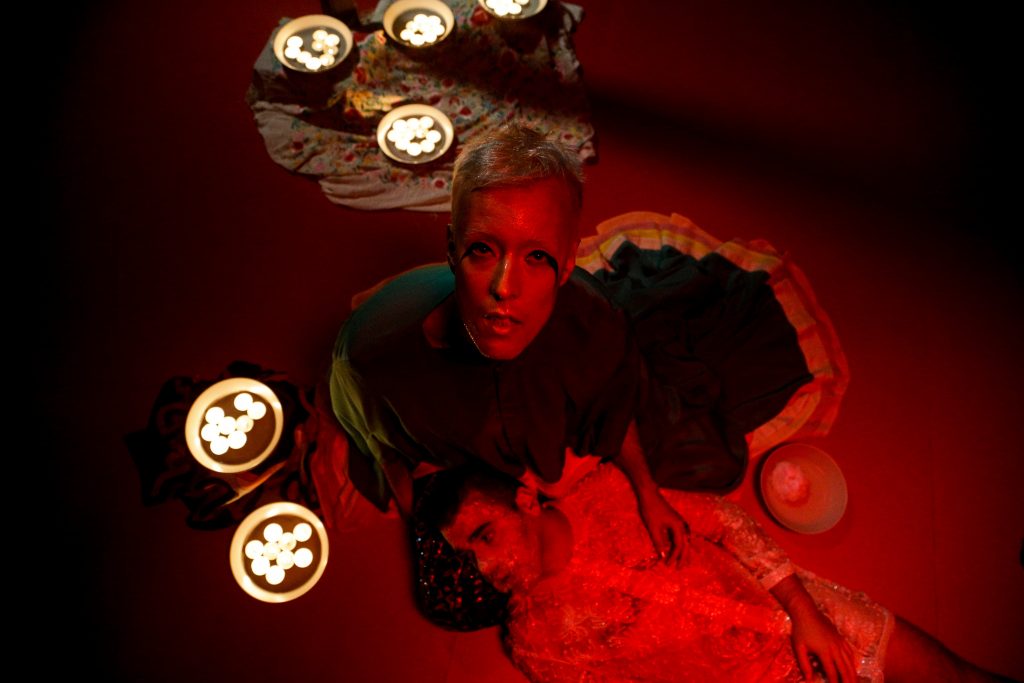Coming up tonight, Thursday evening, at Gaukurinn bar, Fado Bicha will subvert a traditional Portuguese music genre to express a moving perspective on queer identities and experiences in a deeply poetic – yet fiercely activist – show. Be prepared as Lila (singer, writer) and João (instrumentalist, arranger) vow to take you on the craziest emotional rollercoaster, from inspiration to giggles and maybe even tears.
In the meantime, they kindly agreed to answer our many questions about fado, subversion, perceptions of sexual/gender difference in Portugal and much more.
How did you guys end up in Iceland of all places in the heart of winter? What’s got into you?
Lila: “Ahaha! It’s a funny story, actually. We bought the tickets to come last June. I have had the dream to visit Iceland since I was a child, there was always something pulling me, some kind of mythical projection, even before I fell in love with artists like Björk, Sigur Rós or Ólöf Arnalds. I was telling João about this and also that I have a childhood friend living in Akureyri for some years and I was so sorry I hadn’t visited her yet. At the same time, João was checking for flights on his phone, not telling me. And he found a flight for 200€ and said I’m gonna buy it! And I was like OK! So that was it. It was only in December that I remembered again we were coming to Iceland and with a very unpleasant twist: we were broke as shit! We thought of cancelling the trip, then we thought we could play outside for money (we forgot about the cold) and then we started searching for places where we could perform and Gaukurinn opened their doors to us. So that’s the story of our winter journey to the north.”
“To be allowed to be queer in Portugal is still a privilege that comes along with economic power or influence, like in artistic milieus. It’s definitely not a feature easily displayed outside of the main urban centers and even there it’s not easy.”
Can you explain to our least cosmopolitan readers what Fado Bicha stands for?
Lila: “Fado is a traditional music genre in Portugal, possibly the one most linked to a national identity and heritage; it began to solidify as a genre in itself in the end of the 18th century and, although it was, in the beginning, an expression of the outcasts of the society (poor people, migrants, sexual workers, alcoholics) it became quite elitist through time and very conservative (mostly because it was instrumentalized during the 40-years dictatorship in Portugal). And bicha (pronounced “beesha”) is a very strong slur to offend a (person perceived as a) man who behaves in a way that is considered feminine. It’s a verbal punishment for “wrongful effemination”, showing how the feminine itself is considered a lower, shameful category in a patriarchal society such as Portugal.
We refused to accept that our queer identities didn’t belong or fit in the universe of fado and created a new space where we could explore this heritage through our experiences and viewpoints, speaking and singing about violence, sex, desire, community, resistance, in an ultimately throwback to the time when fado was an intervention song.”
If I’ve got my classics right, fado is usually quite sad: if I come to your show tonight, should I bring tissues?
João: “Ahaha, you definitely should! Fado is not only sad, it’s emotional and genuine in general, and the topics can go from joyful appreciation and carelessness to despair and death. Our show is also very complete in terms of emotions, given that we speak about stories of violence and oppression but also of overcoming, community, resistance and love, mostly of queer existence but also about Portuguese History (endemic racism, Slavery), feminism and the history of fado itself.”
Not only is fado usually sad, it’s traditionally non-political if I’m not mistaken (or very low-key): how did you come to subvert the genre?
Lila: “You seem to know a lot about fado! True, it hasn’t been political at all in the last decades and there aren’t many traces of this feature in older periods – there are some, at the cross of the 20th century, linked with anarchism, republicanism and political critique. For us, it was only natural to go that way. Our bodies and expressions are necessarily political in that we need to understand our political place in the world in order to create strategies of survival and thriving. The clash that I felt when I first started singing fado (that if I wanted to sing, I would have to give up parts of myself and conform to a male prototype, when I’m not even a man) pushed me to wanting to use fado as a tool of expression and intervention. Furthermore, I feel that fado is perfect for that! The words, the poems are very central to the genre, it’s a very verbal kind of music. And the musicality of it is so popular, so easily reachable, especially for someone growing up in Portugal. If you mix those two features, you get the perfect tool for creating powerful musical narratives of intervention!”
What does it feel to be queer in Portugal? How’s the general attitude toward queerness?
João: “Hummm… I would say the general attitude is quite violent. At home, in the schools, in the public space. Gender roles are still very rigid and transgression is very signaled and often punished, mostly for queer gays and trans-feminine people. To be allowed to be queer in Portugal is still a privilege that comes along with economic power or influence, like in artistic milieus. It’s definitely not a feature easily displayed outside of the main urban centers and even there it’s not easy. The thing is that Portuguese culture values modesty and restraint so, as you get older, this violence turns from direct bullying and physical violence in school to more insidious ways of discriminating and oppressing, that are not easily recognizable by others, which leads to situations of isolation. Queer people and especially trans people still face very precarious living and working conditions. I would say that things improved over the last years, Portugal has a very advanced legislation regarding LGBTI issues but the general population remains very ignorant about who we are and about what our undeterrable existence says about the ruling concepts of gender and identity.”

What have you heard or experienced in regards to the LGTBQ+ scene in Iceland?
Lila: “About the LGBTI art Scene, not much to be honest… I heard and read about Hatari, who represented Iceland in last year’s Eurovision but I didn’t watch the performance because I personally boycotted the whole event for being held in Israel. I know that John Grant is living in Iceland, he’s amazing! I hope we get a chance in these 10 days we’ll be here to get to know about more artists. In general, I know Iceland is one of the safest places in the world to be LGBTI, has advanced legislation… I don’t know so much about trans rights – well I know you don’t have gender self-determination, which is, in my opinion, a basic human right, that we were only able to achieve in Portugal in 2018.”
“Queer people and especially trans peoplw still face very precarious living and working conditions.”
What’s next after Gaukurinn?
João: “Well, after Gaukurinn, we go to Akureyri, to meet Lila’s friends and we’ll be staying there, enjoying their company and visiting different places in the north of Iceland. The north of the north!! We’re bracing ourselves already. Then, we go back to Portugal and keep recording our first album, which will come out hopefully in June.”



